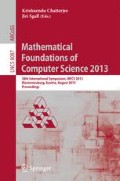Abstract
Valence automata are a generalization of various models of automata with storage. Here, each edge carries, in addition to an input word, an element of a monoid. A computation is considered valid if multiplying the monoid elements on the visited edges yields the identity element. By choosing suitable monoids, a variety of automata models can be obtained as special valence automata. This work is concerned with the accepting power of valence automata. Specifically, we ask for which monoids valence automata can accept only context-free languages or only languages with semilinear Parikh image, respectively. First, we present a characterization of those graph products (of monoids) for which valence automata accept only context-free languages. Second, we provide a necessary and sufficient condition for a graph product of copies of the bicyclic monoid and the integers to yield only languages with semilinear Parikh image when used as a storage mechanism in valence automata. Third, we show that all languages accepted by valence automata over torsion groups have a semilinear Parikh image.
The full version of this work is available at http://arxiv.org/abs/1306.3260 .
Access this chapter
Tax calculation will be finalised at checkout
Purchases are for personal use only
Preview
Unable to display preview. Download preview PDF.
References
Adian, S.I.: The Burnside problem and related topics. Russian Mathematical Surveys 65(5), 805–855 (2010)
Chomsky, N., Schützenberger, M.P.: The algebraic theory of context-free languages. In: Computer Programming and Formal Systems, pp. 118–161. North-Holland, Amsterdam (1963)
Dirac, G.: On rigid circuit graphs. Abhandlungen aus dem Mathematischen Seminar der Universität Hamburg 25(1-2), 71–76 (1961)
Gilman, R.H.: Formal Languages and Infinite Groups. DIMACS Series in Discrete Mathematics and Theoretical Computer Science, vol. 25, pp. 27–51. American Mathematical Society (1996)
Green, R.E.: Graph Products of Groups. Ph.D. thesis, University of Leeds (1990)
Greibach, S.A.: Remarks on blind and partially blind one-way multicounter machines. Theoretical Computer Science 7(3), 311–324 (1978)
Howie, J.M.: Fundamentals of Semigroup Theory. Clarendon Press, Oxford (1995)
Jantzen, M.: Eigenschaften von Petrinetzsprachen. Ph.D. thesis, Universität Hamburg (1979)
Kambites, M.: Formal languages and groups as memory. Communications in Algebra 37, 193–208 (2009)
Kopczynski, E., To, A.: Parikh images of grammars: Complexity and applications. In: Proceedings of LICS 2010, pp. 80–89 (2010)
Kruskal, J.B.: The theory of well-quasi-ordering: A frequently discovered concept. Journal of Combinatorial Theory, Series A 13(3), 297–305 (1972)
van Leeuwen, J.: A generalisation of Parikh’s theorem in formal language theory. In: Loeckx, J. (ed.) ICALP 1974. LNCS, vol. 14, pp. 17–26. Springer, Heidelberg (1974)
Lohrey, M., Sénizergues, G.: When is a graph product of groups virtually-free? Communications in Algebra 35(2), 617–621 (2007)
Lohrey, M., Sénizergues, G.: Rational subsets in HNN-extensions and amalgamated products. Internat. J. Algebra Comput. 18(01), 111–163 (2008)
Lohrey, M., Steinberg, B.: The submonoid and rational subset membership problems for graph groups. J. Algebra 320(2), 728–755 (2008)
Render, E.: Rational Monoid and Semigroup Automata. Ph.D. thesis, University of Manchester (2010)
Wolk, E.S.: A note on ”the comparability graph of a tree”. Proceedings of the American Mathematical Society 16(1), 17–20 (1965)
Zetzsche, G.: On the capabilities of grammars, automata, and transducers controlled by monoids. In: Aceto, L., Henzinger, M., Sgall, J. (eds.) ICALP 2011, Part II. LNCS, vol. 6756, pp. 222–233. Springer, Heidelberg (2011)
Zetzsche, G.: Silent transitions in automata with storage. In: Fomin, F.V., Freivalds, R., Kwiatkowska, M., Peleg, D. (eds.) ICALP 2013, Part II. LNCS, vol. 7966, pp. 434–445. Springer, Heidelberg (2013), http://arxiv.org/abs/1302.3798
Author information
Authors and Affiliations
Editor information
Editors and Affiliations
Rights and permissions
Copyright information
© 2013 Springer-Verlag Berlin Heidelberg
About this paper
Cite this paper
Buckheister, P., Zetzsche, G. (2013). Semilinearity and Context-Freeness of Languages Accepted by Valence Automata. In: Chatterjee, K., Sgall, J. (eds) Mathematical Foundations of Computer Science 2013. MFCS 2013. Lecture Notes in Computer Science, vol 8087. Springer, Berlin, Heidelberg. https://doi.org/10.1007/978-3-642-40313-2_22
Download citation
DOI: https://doi.org/10.1007/978-3-642-40313-2_22
Publisher Name: Springer, Berlin, Heidelberg
Print ISBN: 978-3-642-40312-5
Online ISBN: 978-3-642-40313-2
eBook Packages: Computer ScienceComputer Science (R0)

